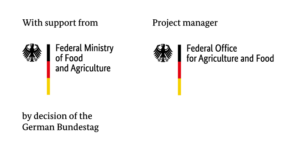Digitalization of Agriculture
AI for plant evaluation
Research Focus: Applied Artificial Intelligence
The BoniKI research project investigated how Artificial Intelligence (AI) can make agriculture and rural areas fit for the future.
At the final event of the X-KIT networking and transfer project in Kaiserslautern/Germany on April 25-26, 2024, the BoniKI research project presented a holistic, easy-to-use solution: an autonomous and plant-specific scoring system that uses Artificial Intelligence (AI) methods to carry out an automatic assessment and thus digitalize an essential tool in agriculture. Instead of having staff with several years of experience walk the fields with a clipboard and evaluate plants manually, unmanned aerial systems take over. They generate high-resolution aerial photographs of plants and classify them quickly and efficiently using neural networks.
Consolidated experience thanks to continuous field trials
Under the consortium management of the FZI Research Center for Information Technology, the project successfully brought together the expertise of all partners. The start-up SAM-DIMENSION GmbH, for instance, developed unmanned aerial systems (UAS) with unique sensor technology to create high-resolution maps. The project partner offers drone-based weed mapping that helps to recognize emerging weed problems and reduce herbicide application through more targeted use. In the next step, the FZI used the generated high-resolution maps to identify crops such as corn, winter wheat, and barley on a field and individual plant basis and analyzed them using image evaluation and AI methods. With the expertise of its inspectors, Landwirtschaftliches Technologiezentrum Augustenberg (LTZ) contributed domain knowledge, training data, and a manually collected baseline to the successful project conclusion: AI can now take over plant evaluation for automated assessment.
The evaluation was done in an integrated pipeline with minimal human intervention. From the high-resolution georeferenced UAS images, individual plants were first determined using a so-called Siamese neural network. In the next step, these plants were analyzed for selected evaluation parameters using a MultiNet approach. For the training of the AI, the extensive image data from various LTZ field trials and from state variety trials in corn and cereals (winter wheat, winter barley, and spelt) over three years were used and labeled manually by experts. The results show that the AI works with excellent reliability and recognizes relevant features even under challenging conditions.
Expertise right at hand
Thanks to the AI-based scoring system, a simple and comprehensive assessment can now be carried out quickly and easily at various locations via drone flights. This could help to make agriculture more sustainable, transparent, and efficient in the future, as AI-based assessment saves time and can also be used to analyze other crops.
AI methods for more efficiency and sustainability
The 36 AI projects, funded by the Federal Ministry of Food and Agriculture (BMEL), presented their results at the final X-KIT event. Alongside the project presentations, there was a trade fair with poster sessions and an exhibition of the demonstrators. Aerial photographs of the field, detailed images of the analyses, and the associated evaluation provided a direct insight into applied technologies and achieved progress. Invited participants were researchers from the 36 AI projects and representatives of both the BMEL and the Federal Office for Agriculture and Food.
Overall, the closing event emphasized the potential of AI methods to improve the efficiency and sustainability of the agricultural sector.
About the project:
The BoniKI project focuses on the automation of plant evaluation. Plant evaluation – such as the assessment of pest infestation in crops – is time-consuming, cost-intensive, and requires many years of experience. A manual process is required in which plants are randomly inspected, and overall assessments are determined using statistical analyses.
About the FZI
The FZI Research Center for Information Technology, with headquarters in Karlsruhe and a branch office in Berlin, is a non-profit institution for information technology application research and technology transfer. It delivers the latest scientific findings in information technology to companies and public institutions and qualifies individuals for academic and business careers or the leap into self-employment. Supervised by professors from various faculties, the research groups at the FZI develop interdisciplinary concepts, software, hardware and system solutions for their clients and implement the solutions found as prototypes. The FZI House of Living Labs provides a unique research environment for application research. The FZI is an innovation partner of the Karlsruhe Institute of Technology (KIT) and a strategic partner of the German Informatics Society (GI).




Press contact
Valérie Hasler
Division Manager Communications
- +49 721 9654-345
- presse@fzi.de
- Headquarters Karlsruhe
Download press information (pdf):
Download media:
Click for download.
More downloads & links:
